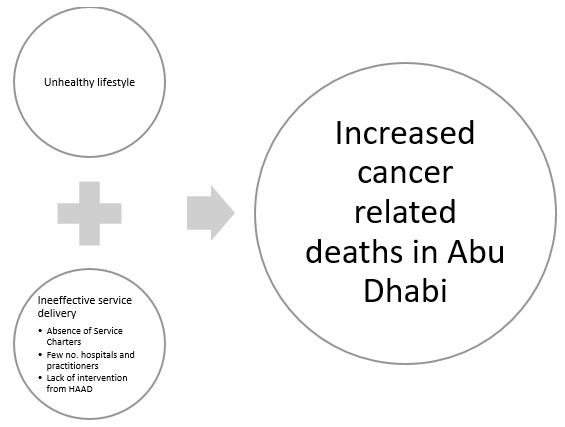Introduction
This study examines the problems faced by the Health Authority -Abu Dhabi (HAAD) in the management of public health. The investigation aims to use TQM and QCC tools to identify, analyze, and provide solutions to the challenges faced by HAAD in the control of cancer and cardiovascular diseases in Abu Dhabi. The objective of the study is to draw a comparison between the quality of services offered with and without the use of TQM and QCC tools in the organization. HAAD is the organization, which controls the Healthcare Department in Abu Dhabi. The body outlines policies for the health system while consistently monitoring the populace’s general health status to guarantee quality healthcare in Abu Dhabi. HAAD forms the system’s governing structure, carries out assessments to ensure abidance by guidelines, implements standards, and supports the assumption of topnotch performance and practices by healthcare providers in Abu Dhabi. HAAD also encourages programs to heighten consciousness and the implementation of healthy living ideals among the population of Abu Dhabi.
Project Description
Cancer is a chronic health problem, which has posed a great challenge to health systems globally. The increase in cases of cancer in Abu Dhabi can be attributed to unhealthy lifestyles such as unhealthy eating, lack of body exercise, stress, obesity, and smoking, among others (Loney, 2013). Issues such as the lack of enough hospitals that provide cancer care and a shortage in the number of medical practitioners, as well as the lack of proper intervention from HAAD have derailed the fight against cancer (HAAD, 2015). The inability to have one particular cause of cancer has made it harder to prevent it, thus leaving health organizations with the option of early detection and treatment. The treatment has also proved expensive and not always available for all.
The process of cancer treatment also involves long repetitive processes, which are not always successful, especially for patients in their late stages. Another challenge that HAAD has met in dealing with cancer is its ability to develop over long periods in the body undetected (HAAD, 2015). This situation reduces the chances of success of the treatment (Loney, 2013). Cancer treatment requires special equipment, which is costly for hospitals to acquire. Therefore, serving machines are less compared to patients who are in need of treatment. One impact of the increase in cancer cases is the increase in cancer-related mortality. Cancer has become one of the leading causes of death in Abu Dhabi. Increased cases of cancer have also led to an increase in HAAD’s budget towards cancer awareness, prevention, diagnosis, and treatment. Cancer has also led to cases of early retirement among the Abu Dhabi workforce.
Total Quality Management (TQM) is a management framework, which comprises tools, methodologies, and values. Some of the values of TQM include continuous improvement, prioritizing the consumer, and total commitment of all the stakeholders, among others (Amirullah & Suratman, 2015). The introduction of TQM in an organization calls for the total dedication of the employees to the outlined goals. TQM has been credited for helping to deal with public problems and administration. It has been specifically branded as an effective solution for the rapidly increasing costs of healthcare and substandard health services. It boosts the quality of services offered while reducing the costs. A Quality Control Circle is a small group of between three to ten forefront operatives who work under the same supervisor (Fukui, 2003). The operatives constantly regulate and advance the fineness of their services, products, and work. QCC functions independently. It applies quality control techniques, tools, and concepts. QCC activities play a vital role in the management system of a company since they improve the quality of services offered by a company (Fukui, 2003).
Project Details
Data collection
The data collection was performed in accordance with seven QCC tools. First, stratification was utilized to help in understanding the cancer prominence and factors that cause it as a public health issue in Abu Dhabi. Data to be stratified was recovered from public health employees, patient records in hospitals, recent peer-reviewed journals, and reports from health agencies. The information retrieved about the Abu Dhabi constituents appeared in categories that comprised different strata before being equated with revealing any latent features present in the data (Fukui, 2003).
Notably, the study utilized a systematic examination of published peer-reviewed texts and government publications from health officials and institutions. Personal contact was also made with HAAD officials and practitioners serving local infirmaries. Electronic databases such as PubMed, PyscINFO, and EBSCOhost to access relevant, recently published medical journal documents. Some of the main entry terms used included public health, Abu Dhabi, oncogene, mortality rate, cancer reports, and TQM. Moreover, yearly health statistics and reports available in local health authorities such as the American Academy of Dermatology (AAD) were manually recovered from their respective websites. Other secondary sources, such as books that focused on TQM and public health management, were used. The admissibility criteria for the researches included the presence of a credible empirical research or case study about public health in Abu Dhabi and the application of TQM in public health management. Both numerical and verbal data were collected. The verbal language was then decoded to reported language in the data analysis (Fukui, 2003). Moreover, the study used multi-value expressions to provide a more exhaustive assessment of the information.
Findings
Check sheet
Cause and Effect Diagram

Pareto Analysis

The available data shows that cancer causes more than 10% of deaths in Abu Dhabi. However, the absence of a regional demographic-based cancer registry meant that the information suffered some inaccuracies. Unhealthy lifestyle and poor patient care were recorded as some of the main causes of increased cancer-induced mortality rate (HAAD, 2013). The strategies adopted by most hospitals to maintain quality improvement in the facilities and HAAD were worrying. First, although HAAD had a quality department that monitors service delivery, it did not meet the standard of TQM philosophy. Most practitioners made autonomous decisions when treating patients. Moreover, no interdisciplinary discourse on standards was available to offer proper cancer management in hospitals. There was also poor cooperation between private and public hospitals in terms of developing policies that would guarantee proper cancer diagnosis and management.
The existing studies reveal that most patients are unaware of the quality service they should expect from physicians. Few patients had read the service charters. Thus, they tolerated the conventional method of service delivery. Furthermore, for those who had raised complaints, the issues were not addressed with urgency due to the absence of proper quality units. Nevertheless, there were infirmaries that adequately implemented TQM concepts in the administration of service. These hospitals recorded impressive patient outcome and with few cancer death cases. The results revealed that TQM ensured continuous quality service delivery, thus making it a concept that HAAD officials should consider.
Recommendations
While TQM promises solutions to various quality management problems such as controlling the upsurge of cancer in Abu Dhabi, HAAD has not entirely implemented its ideologies. The public health issues that the company faced may be resolved if it implements the following recommendations in line with TQM:
Introducing customer-oriented law enforcement
The prevailing philosophy in TQM involves ensuring customer satisfaction and steady quality development. The findings of the study revealed that HAAD lacked a reputable department that received complaints from cancer patients. It took measures to improve quality. Such deficiencies led to increased cancer-induced mortality rates (Amirullah & Suratman, 2015). The health authority should initiate customer-oriented policies, which involve establishing quality offices that monitor customer satisfaction among health care providers from private and public quotas. Quality offices should comprise multidisciplinary representatives. The quality units will play the role of receiving customer complaints, conducting an in-depth analysis of customer feedback, and/or introducing polices, which promote quality in cancer management. The quality departments should use a systemic approach to handling customer complaints (Fukui, 2003).
Establishing operational Service Charters
In most hospitals, it was evident that practitioners applied the orthodox technique of handling patients. The method entails delivering service in accordance with the physicians’ understanding. Regrettably, it derails quality improvement. There is the need to consider the patients’ perception of quality. Consequently, HAAD should ensure Service Charters are frequently revised for the clinicians to meet certain basic standards as desired by patients (Hajat, Harrison, & Shather, 2012). When setting the Service Charters, HAAD should consider the input of specialists, patients, administrative staffs, and any other stakeholder. Ultimately, health officials should consider the Service Charters as part of the total organization-wide plan to ensure they are for the benefit of the customers.
Promoting teamwork in service delivery
HAAD should strive to eliminate all the internal policies that encourage autonomy in service delivery. Private and public hospitals should promote a culture of engaging quality improvement discourse and initiating joint policies that enhance patient care. This plan should then trickle down to the infirmaries where any communication barriers that exist among doctors, nurses, and junior staff members are terminated. HAAD should uphold an interdepartmental cooperation towards the institution’s quality goals (Amirullah & Suratman, 2015).
Conclusion
There has been an increase in the number of reported cancer cases over the past few years in Abu Dhabi. This situation has in turn increased the number of cancer related deaths. This rise can be attributed to unhealthy lifestyle, exposure to cancer-causing substances, as well as lack of proper medical care and awareness among the population. HAAD regulates and creates health policies for the health system in Abu Dhabi. Therefore, it is responsible for making policies that boost the fight against cancer and promote awareness among people. The lack of proper intervention of such a body in the fight against cancer or other chronic illnesses is likely to lead to an increase in deaths that relate to such diseases. Therefore, a need arises for methods that guarantee quality services to be implemented. Such methods will ensure that HAAD employs measures that guarantee that quality cancer treatment services are offered to the patients at the most affordable cost. The implementation of TQM ideologies by HAAD will provide a significant boost to cancer management in Abu Dhabi.
Reference List
Amirullah, I., & Suratman, A. H. (2015). Total Quality Management (TQM) Application in Health Care. International Journal of Academic Research, 7(1), 5-8.
Fukui, R. (2003). Handbook for TQM and QCC. New York, NY: Inter-American Development Bank Publications.
HAAD. (2013). Health Statistics 2013. Web.
HAAD. (2015). About HAAD. Web.
Hajat, C., Harrison, O., & Shather, Z. (2012). A profile and approach to chronic disease in Abu Dhabi. Globalization and Health, 8(1), 18-18.
Loney, T. (2013). An analysis of the health status of the United Arab Emirates: the ‘Big 4’ public health issues. Web.